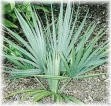Saw palmetto drought drives prices up, raises supply questions
leaving further room for low-quality or fake products to enter the
market, says Valensa International.
The Eustis, Florida-based manufacturer claims to supply approximately 30 percent of the world's saw palmetto ingredients market. It has sent two memorandums recently to clients informing them of price increases - undisclosed to NutraIngredients-USA - which it says are the direct result of the drought shrivelling its harvest. Masquerading ingredients has been a problem across the entire nutraceutical industry, and the delicate nature of saw palmetto supply combined with high demand means it has been no exception. Now, the plant's increasingly precarious supply is set to exacerbate this. "We have a situation where a lot of the easy-to-pick berries are gone," Valensa president Rudi Moerck told NutraIngredients-USA. Wild-harvested in the southwestern US, namely in Florida, saw palmetto has been linked in scientific literature to supporting prostate health. Valensa holds two patents for the ultra high extraction of oil from the berries of this palm mutant - the product of which the company markets under the brand USPlus. Valensa insists that much of the health benefits of the berries are lost if they are picked too early, as they have not had time to develop sufficient amounts of the oil where the biologically active compounds are contained. It is the oil and not the powder from ground-up berries that has been used in studies on prostate health, according to Moerck. Most of what is on the market this year, will likely be from the lower quality green berries, said Moerck. The company is getting the message out on such ingredients. "The 2007 saw palmetto berry harvest, which in past years would have barely started by Labor Day weekend, is nearing completion and has proved to be worse than predicted in our earlier pre-harvest evaluation," said Valensa in one of the letters issued to clients. It is differentiating its activities from those of some other suppliers it says have taken what little there was of the harvest. "The aggressive buying activities of a few of the berry buying companies and their willingness to pay exorbitant prices for green, immature, low quality berries has encouraged pickers to harvest with no regard for quality or ripeness," continued the company in a letter. The price of saw palmetto raw material has subsequently shot up between 30 and 50 percent across the board over last year as supply continues to tighten, and Valensa has twice raised its own prices. For raw berry material, the price now stands at around $1/lb or $80/kilo. While Moerck affirmed "price increases can always lead to unscrupulous behaviour" on the part of supplier, he thinks the greater level of awareness surrounding counterfeit ingredients means this tight supply will not result in a glut of fake saw palmetto on the market. He cited the resent controversy over contaminated and adulterated ingredients from China as quelling some of the fears that cases of fake versions of saw palmetto will increase in the future. Now that formulators know about supply chain safety issues, they will perhaps be more vigilant. In terms of protecting its own business in light of the drought's impact, Valensa will ramp up efforts to strengthen its position in the market. "We will reemphasize the marketing of USPlus as a premium brand and deemphasize the commodity product," said Moerck. Valensa harvests and processes its saw palmetto all in-house at its site in Florida. The cyclical nature of droughts - which often occur in five to seven year phases - as well as the seasonal threat of hurricanes in the region will continue to threaten the company's supply.












